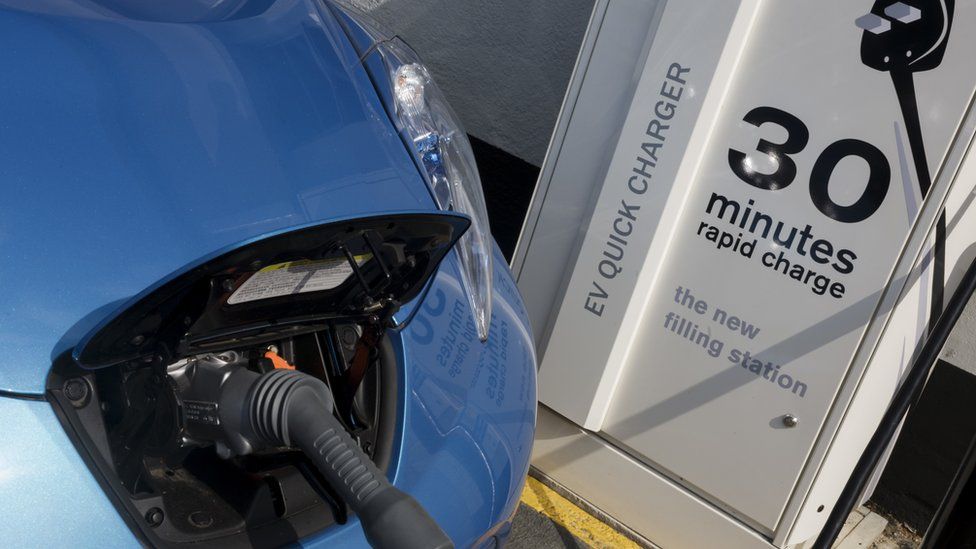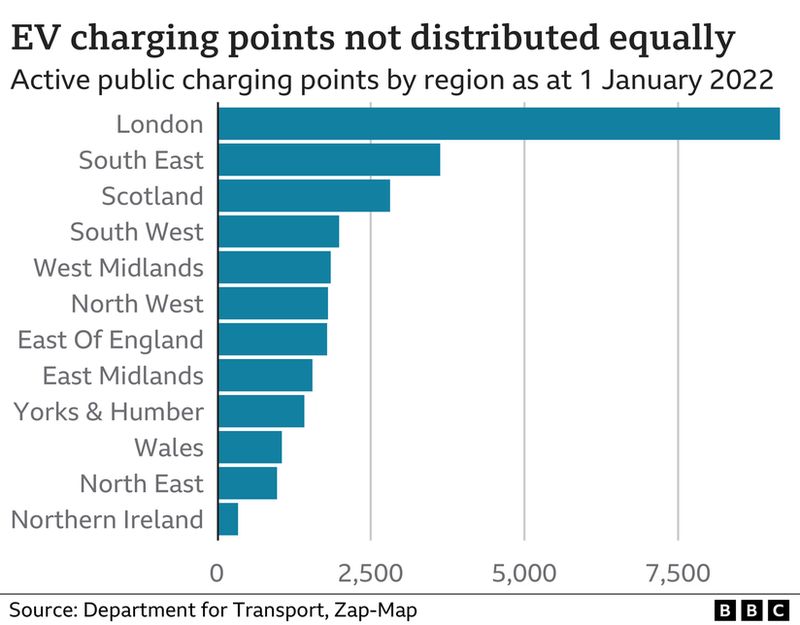Fuel prices: Could I save money driving an electric car?
As petrol and diesel prices continue to increase, interest in electric vehicles is rising …

By Esme Stallard
BBC News
- Published
- 5 hours ago
 Image source, Getty Images
Image source, Getty ImagesThere are nearly half a million electric cars in the UK, and rising fuel prices have prompted more people to consider making the switch.
The government is banning the sale of new petrol and diesel cars from 2030, a decade earlier than originally planned.
What does it cost to charge an EV?
Public charging costs vary but this hybrid approach could cost about £48, still significantly cheaper than conventional fuel.
How much do electric cars cost to buy?
But for now, a typical new electric car remains more expensive than an equivalent petrol or diesel model – ranging from £23,000 to £43,000.
However, cheaper second-hand EVs are increasingly available.
The BBC found a number of used five-seater electric hatchbacks for between £8,000 and £21,000.
Leasing offers another option. According to Leasing.com, the demand for EVs in 2021 was greater than for diesel or petrol cars.
It says the current average monthly payment for a five-seater hatchback is less than for the diesel equivalent:
- EV £455.93
- diesel £480.22
- petrol £308.48
What about other costs?
Depending on the model and age of your EV, you may be entitled to a reduction in vehicle tax or be exempt. Some councils waive residents’ parking fees for EVs. Electric cars also don’t have to pay the London congestion charge.
Electric cars typically require less ongoing maintenance than petrol or diesel cars, but EVs do need to have annual MOTs after three years.
How long does it take to charge EVs?
This depends on the model and the speed of the charger.
 Image source, Getty Images
Image source, Getty ImagesRapid chargers allow drivers to “refuel” in less than an hour
It can take between six and 12 hours using a slow home charger, or 20 to 40 minutes with a rapid public charger.
These let you charge quickly, or in the middle of a longer journey.
Where can I charge my electric vehicle?
London has more than twice as many as any other region – with one charger for every 824 people, whereas Wales has one charger per 2,696 people.

As part of its EV strategy, the government plans to increase the number of chargers ten-fold by 2030.
However, only 800 new chargers are currently being installed every month. This would need to increase to 2,500 to meet the target.
How many miles can you get from a full charge?
On average, the five best-selling EVs in the UK can travel more than 200 miles on a full charge.
This is the same as travelling from Bristol to Leeds, or London to Swansea.
However, batteries deteriorate with use, which reduces their performance – typically by about 9% over the battery’s lifetime.
Providers such as Nissan and Tesla guarantee their batteries for up to eight years or 100,000 miles.
What are the different charging plugs?
Unlike the standard fuel nozzles used to deliver petrol and diesel, there are five different plug types for electric vehicles.
 Image source, Getty Images
Image source, Getty ImagesA type 2 plug
The type 2 plug is the most common in the UK, and can be connected to slow or rapid chargers.
Drivers also need a dedicated home charging unit, costing between £550 and £1,100. A normal three-pin plug socket will work in an emergency but will be much less efficient.
Are EVs better for the environment?
Because of the different minerals required, manufacturing an EV creates more greenhouse gas (GHG) emissions than a diesel or petrol vehicle.
Given this, the BBC calculates that an EV’s environmental impact will be lower than that of a petrol car within 18 months of ownership, or two years for a diesel car.
The carbon emissions generated by running the car depend on how the charging electricity is produced.
As the UK produces more of its electricity from renewable energy, EVs will produce even fewer carbon emissions per mile.

Another key issue is the materials required for EV batteries, and how these are disposed of when dead.




